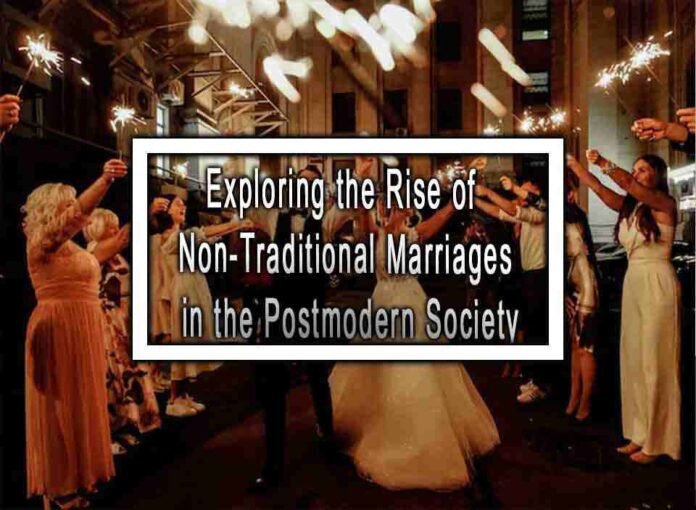In postmodern society, there has been a notable rise in non-traditional marriages, reflecting changing attitudes towards relationships and family structures. These non-traditional marriages challenge traditional norms and offer individuals greater flexibility in defining their partnerships. Several factors contribute to the rise of non-traditional marriages:
1. Individual Autonomy:
In postmodern society, there is an increasing emphasis on individual autonomy and self-determination. People are more inclined to seek relationships that align with their personal values, desires, and needs rather than conforming to societal expectations.
2. Gender Equality:
As gender roles continue to evolve, more couples are seeking egalitarian relationships where responsibilities and decision-making are shared more equally between partners. Non-traditional marriages often embrace this shift towards greater gender equality.
3. Recognition of LGBTQ+ Rights:
The growing recognition and acceptance of LGBTQ+ rights have led to an increase in same-sex marriages and partnerships. As societies become more inclusive, non-traditional unions gain legal recognition and societal support.

4. Delayed Marriage and Cohabitation:
In postmodern society, there is a trend towards delayed marriage and an increase in cohabitation. Couples may choose to live together without a formal marriage, opting for committed relationships without legal ties.
5. Emphasis on Emotional Fulfillment:
Modern relationships place greater emphasis on emotional fulfillment and compatibility rather than solely economic or practical considerations, leading to diverse relationship models.
6. Desire for Non-Traditional Parenting:
Some non-traditional marriages involve co-parenting arrangements where individuals come together to raise children outside of traditional nuclear family structures.
7. Technological Advancements:
Technological advancements, including online dating platforms, have expanded people’s options for finding partners, leading to a wider array of relationship dynamics.
8. Globalization and Cultural Exchange:
As societies become more interconnected through globalization, people are exposed to diverse cultural practices and relationship models, influencing their own choices.
9. Higher Education and Career Aspirations:
The pursuit of higher education and career aspirations has led to changes in relationship dynamics, with some couples choosing non-traditional arrangements that accommodate individual ambitions.
10. Individualized Approach to Happiness:
In postmodern society, there is a greater focus on personal happiness and well-being. Non-traditional marriages may emerge as individuals seek relationship structures that align with their unique happiness goals.
While non-traditional marriages are gaining acceptance and recognition, they can also face challenges. Societal attitudes, legal frameworks, and cultural norms may not fully support or accommodate these diverse relationship models. However, as postmodern society continues to evolve, it is likely that non-traditional marriages will become increasingly common and normalized as part of the broader spectrum of relationship possibilities.











